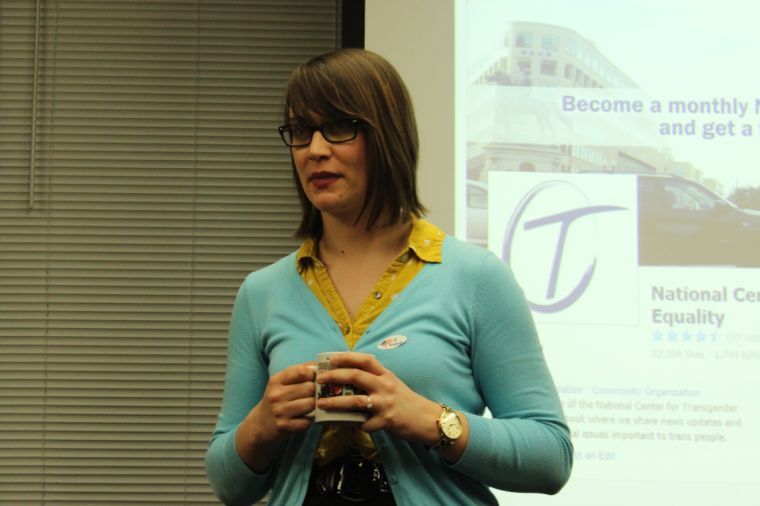
Transgender rights advocate Andy Bowen speaks to university students in South Campus Commons Tuesday about her work improving health insurance coverage and birth certificate changes.
Students do not have to be policy or law professionals to become full-time social advocates, transgender rights activist Andy Bowen told students Tuesday.
Bowen spoke to about 15 students and faculty members in South Campus Commons about her work advocating for transgender issues in Washington, including working to improve health insurance coverage and birth certificate changes. The event was part of the Beyond the Classroom lecture series.
Bowen attributed much of her success to persistence. She told a story in which she wanted to talk to D.C. Mayor Vincent Gray about providing better health care to transgender people. Initially she had trouble reaching him, but ended up escorting him from his car before a speech.
Bowen’s drive is also fueled by the challenges that come with working for transgender rights, she said.
“I think the transgender rights movement is cool because it’s so underresourced,” Bowen said. “I think limitations are fun because you have to come up with creative solutions.”
Meredith Collier, Beyond the Classroom’s assistant director, said she planned the event based on discussions in a course she teaches, UNIV 389T: Social Media for Social Change. She said the students wanted to learn more about advocacy and specifically mentioned gender identity as a topic of interest, and she wanted to bring in a speaker who wasn’t a professor.
Collier said it wasn’t difficult for her to find a relevant speaker, as she and Bowen, a policy associate for the National Center for Transgender Equality, have been good friends since 10th grade.
Bowen graduated from this university in 2008 with a bachelor’s degree in history and a certificate in women’s studies. She is now pursuing a master’s degree in social work at The Catholic University of America.
After graduating, she worked in organized labor advocating for workers’ rights, specifically in the construction industry. The industry is historically conservative in its values, Bowen said, which made working there as a transgender person complicated.
“It was not the most comfortable environment for me to transition, if you can imagine,” Bowen said. She began hormone replacement therapy in secret, wondering if anyone would notice.
Bowen said after she left her first job, she started volunteering with the DC Trans Coalition, a community-based organization devoted to transgender rights in the district.
Bowen was asked if she’d be interested in working to pass the JaParker Deoni Jones Birth Certificate Amendment Act of 2013 — a bill meant to make it easier for transgender people to change their names and obtain updated birth certificates with the appropriate gender marker.
It “used to be incredibly hard to change” legal documents, Bowen said, a difficulty often mirrored in many other facets of a transgender person’s life.
“Homelessness, joblessness, you name it. Transgender people face horrible, horrible circumstances,” she said. “The spirit of the law is that it lowers as many risks for discrimination as possible.”
Though Bowen said she initially had no experience with getting legislature passed, she took on the challenge and months later, in early August, the bill was passed unanimously by the D.C. Council.
Following that victory, Bowen turned to securing transgender health care.
In Washington, transgender people often were undercovered or not covered at all by health insurance, she said. Transgender exclusion clauses in policies meant insurance providers could deny coverage of therapy and procedures related to medical transition or could even deny transgender people coverage entirely.
Bowen said a lot of people say transgender health care is “cosmetic,” but that isn’t the case.
Transgender individuals “actually need it to feel better about life,” she said. “All of this stuff is medically necessary.”
She described in detail the drawn-out process she and other activists went through to guarantee transgender people the opportunity to obtain coverage. They were successful; denial of coverage to transgender people was declared discriminatory, and D.C. insurance providers are now required to provide full coverage of transition-related expenses, although Bowen said there are still many details left to figure out.
Junior history major Jade Johnson said she attended the talk to get extra credit for a class. She said Bowen inspired her to learn more about transgender issues and advocate on behalf of causes.
“She was amazing,” Johnson said. “A lot of the stuff she got done was really inspiring.”
Bowen stressed to the students that previous experience isn’t necessary to be an activist for social change, and that change in one area can help change in another.
“Getting this really amazing radical thing done in location ‘A,’ that makes it less radical to get it done in other places,” she said. “D.C. is a place where you can get really amazing things that they you can’t get done anywhere else.”
Bowen said her experiences have taught her that when people say they can’t do something, they can usually be convinced otherwise.
“If you keep on knocking,” she said, “eventually someone opens the door.”



